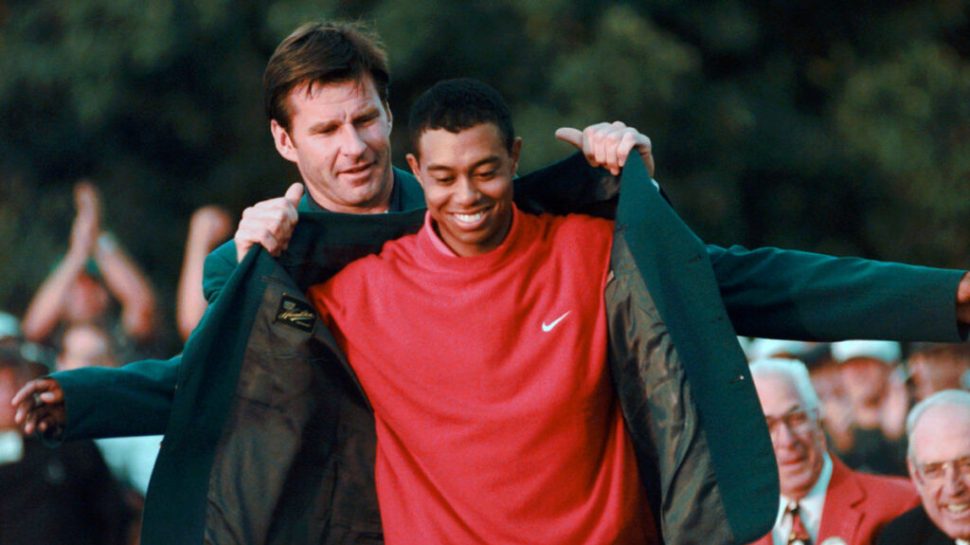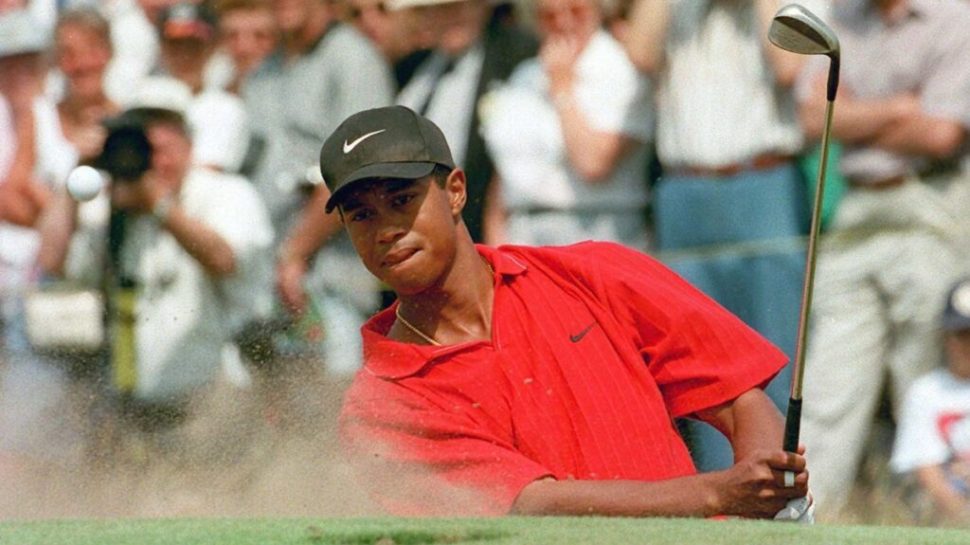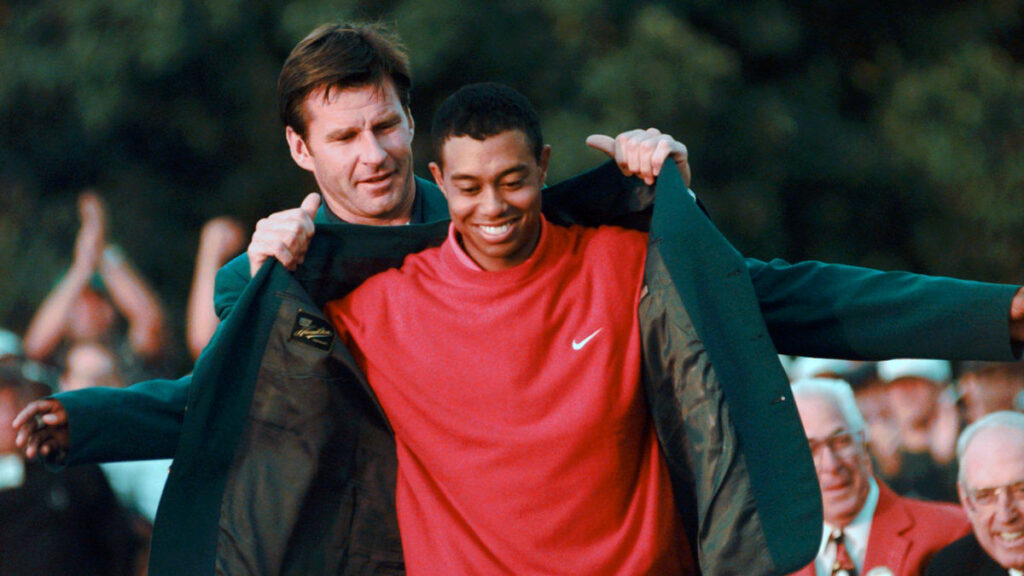
Estimated reading time: 6 minutes
It’s hard to imagine more than a quarter of a century has passed since the emergence of a 21-year-old juggernaut named Tiger Woods and his tour de force 12-stroke triumph at Augusta National in 1997.
The annual April event brings to life a new spring season and with that the crowning of a new champion. 1997 brought to bear far more than the awarding of the traditional Green Jacket but provided a sneak peek for the seismic shift to follow in world golf for the years to come.
Yes, pre-event hype for the ’97 Masters was considerable. The weight of expectations apparent for all to see. The undeniable impact of that Masters victory by Woods marked a point in time equal to past milestones in the sport.
Events including the epic Grand Slam accomplishment by Bobby at Merion in 1930; Ben Hogan’s miraculous comeback from a near death car accident in winning the 1951 US Open at Oakland Hills; the changing of the guard at the 1960 US Open when Arnold Palmer’s epic charge from seven shots back won him title at Cherry Hills, signaled the emergence of a new generation of champions and featured the stellar play of an amateur named Jack Nicklaus who nearly captured America’s national championship. And who can forget the curtain call Masters win in 1986 by a 46-year-old Golden Bear in his sixth triumph at Augusta.
The growing expectations for Woods started on August 28, 1996 when he announced his decision to turn professional. Tiger flashed his wide smile and announced, “I guess, hello world, huh?”
For Woods the bombardment of questions regarding his potential were never ending. Would Tiger be the “next Nicklaus” or would he stumble as so many past other up and coming players had done — unable to meet the high bar of expectations placed upon their shoulders.
Woods claimed two wins before his first year as a pro concluded and he earned another victory starting the 1997 calendar. With all eyes focusing on Augusta, it’s important to point out that Tiger had never finished in the top 20 in a major in six starts as an amateur and his arrival at the 1997 Masters would be his first major as a professional.
In fact, in just six rounds at Augusta National played prior to the 1997 event, Woods had never shot a round below 72. The early stages of his new life as a golf professional were clearly present. Tiger had won in four of his first 14 starts. However, tour events were one thing… major championships quite another.
The arrival of Woods onto the professional golf scene was met with much anticipation and press hype. There were lingering doubters in some quarters on the PGA Tour that he was going to be “next” superstar given his stellar amateur career which included three consecutive US Junior and Amateur titles respectively. Even Nicklaus and Arnold Palmer weighed in predicting Woods would win no less than 10 Masters — equal to the combined total number achieved by Jack and Arnie together.
Tiger was paired in the opening round with the defending champion Nick Faldo. This was a classic point / counterpoint pitting a six-time major winner with three Masters title to his name opposing the young phenom.
The Englishman was renowned for wrapping himself into a self-imposed cocoon with the result providing an unnerving experience for his playing partners. When Woods arrived at the first tee the game face was on. The mission simple. Establish a new sheriff was now in town.
The outward nine went badly for Woods and when he left the par-4 ninth he scored a four-over-par 40. The inward half started with a birdie at the demanding par-4 tenth, followed up with a par at the equally testing par-4 11th. Facing the devilish short par-3 12th, Woods hit his approach long and left of the green. At this point it appeared Tiger would be fortunate to escape with a par. Woods then proceeded to hole his chip shot for a birdie and the floodgates were open for a golf performance never seen at Augusta.
Woods played the final nine in 30 strokes, an incredible ten shots lower than his front nine score. Faldo himself said afterwards that the back nine played by Woods was “the start of his career.”

By the 13th hole of the second round – at roughly 5.30pm local time – Woods achieved sole possession of the lead with a sparkling eagle.
Going into the weekend’s final two rounds Woods held a three-stroke edge over Colin Montgomerie. The Scotsman stated at his post round press conference how he was looking forward to the pairing with Woods and how he believed his past experience in such situations could provide him with a clear advantage.
At the end of the third round Woods simply pulverised Montgomerie with a bogey-free seven-under-par 65 against Monty’s woeful 74. After the round, the crestfallen Scot emphatically stated not only would Woods win the Masters but would actually widen his nine-stroke cushion.
The final round of any Masters event usually provides edge-of-your-seats drama but for Woods the 18 holes were simply a fait accompli, the actual attainment of one of golf’s grandest prizes was an emphatic statement showcasing his presence for all to see. To mark the moment. Woods punched the sky with a fist pump as his final putt found the bottom of the cup, signifying, ‘I have arrived.’.
Amazingly, Tiger set or tied no fewer than 27 records.
Over the final 63 holes Tiger demolished the field and course with a scintillating 22-under-par effort, setting a new four-round total for the Masters at 270 and besting the previous mark of 271 held jointly by Nicklaus (1965) and Raymond Floyd (1976). Interestingly, no previous Masters winner had scored higher than 38 on their opening nine holes of competition.
Woods became the youngest winner of the Masters at 21, breaking the previous mark of 23 set by Spain’s Seve Ballesteros and establishing the greatest margin of victory (12 shots). That eclipsed the previous mark of nine shots, set by Nicklaus (1965).
His victory margin was no less the equivalent of what Secretariat accomplished – a 31-length victory at the 1973 Belmont Stakes and horse racing’s Triple Crown.
The pathway of greatness predicted for Woods was set in concrete with a vintage performance that still resonates today. The comments from CBS lead announcer Jim Nantz when Tiger holed his putt is ever so poignant: “A win for the ages.”
Golf as a sport benefited from an unprecedented boost in attention worldwide. Television ratings whenever Woods was in the field soared. Total prize money on the PGA Tour followed suit and also rose.
The 1997 Masters not only made Woods an overnight global superstar but set in motion a litany of future accomplishments that would simply add to the aura he commanded.
Like night turning into day, Tiger Woods shined a light with utter clarity – epic greatness embodied through tour de force golf. The 1997 Masters provided the pivotal ground floor from which he would only add additional heights of unmatched brilliance in the years to follow.
